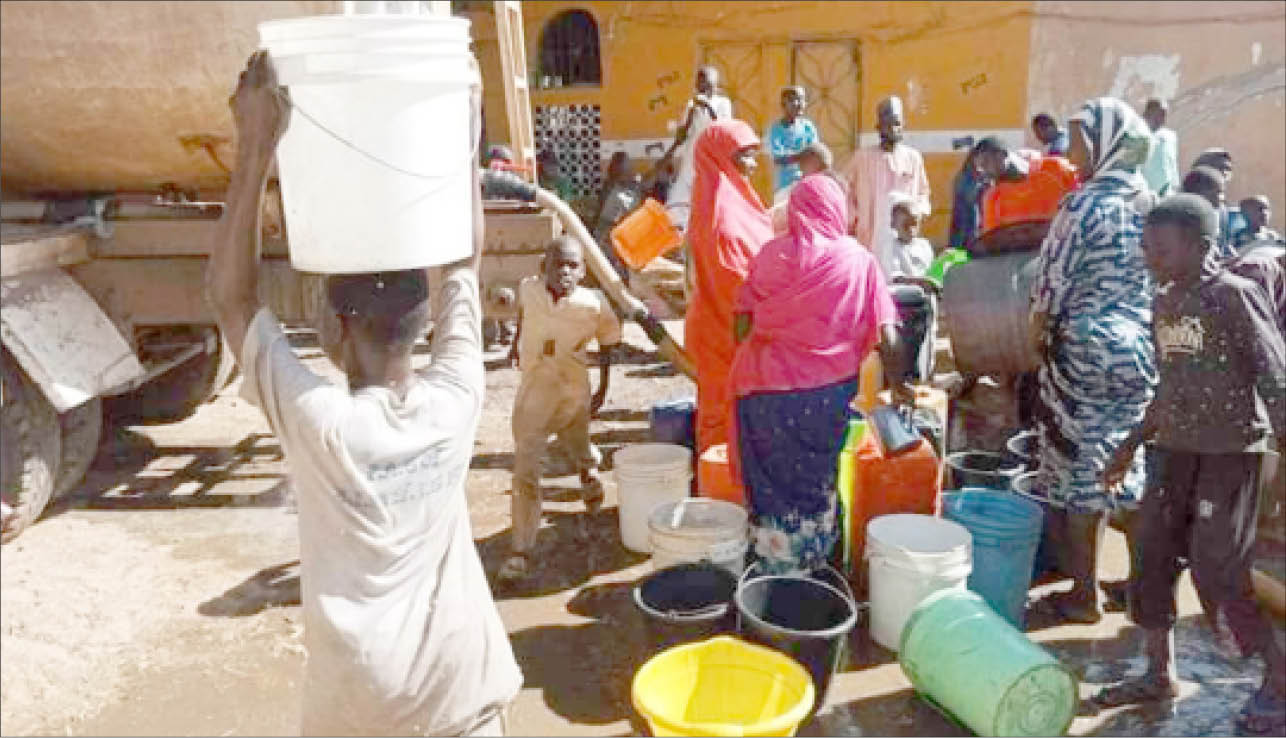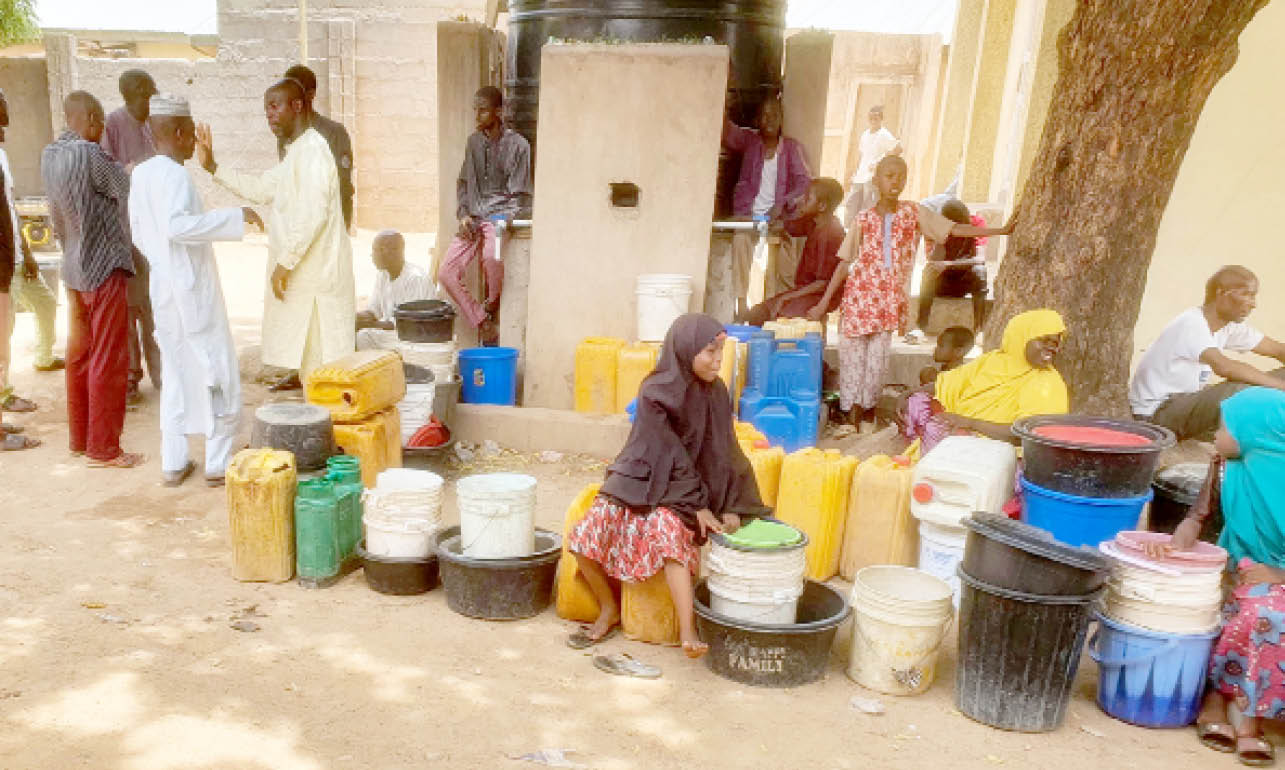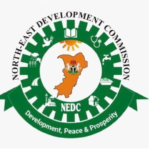Nigerians living in the North East are facing acute water scarcity despite the multi-billion naira budgeted by various state governments for the provision of water.
While those in authority blame epileptic power supply and high cost of diesel as responsible for the problem, residents are forced to explore other sources of getting water for their daily use.
Several weeks back, electricity towers of national greed were destroyed by vandals in Adamawa, Gombe, Yobe and Borno states, which further compounded the situation and plunged the region into block out.
Our correspondents who went round the capital cities of Adamawa, Taraba, Gombe, Bauchi, Yobe, Borno and some other major towns, report that the situation is taking a toll on the livelihood of the people.
- Nigeria makes N356.1bn from cocoa as minister meets committee for options
- Mr President, establish a Social Stock Exchange in Nigeria
According to residents interviewed in the six states, access to potable water is now by struggle, forcing many residents to buy from commercial boreholes, tankers and water vendors exorbitantly.
Adamawa residents groan despite abundant sources
Residents of Adamawa State have decried failure by successive governments to supply pipe borne water to consumers from various rivers and streams.
Some of the residents interviewed said they had not seen water running in their taps for more than a decade despite huge amounts of money being budgeted for that purpose, forcing them to rely on commercial water vendors.
A resident of Yola, Bello Malam Bello, said the price of a 20-liter jerry-can of water rose by about 200 per cent, from N35 to N100, adding that power failure due to vandalism of transmission equipment has put the state in darkness in the last one month.
He said many poor residents found the situation unbearable, adding that the fact that water supply by the water board has been in comatose for more than a decade, the people were left at the mercy of vendors who sourced water from commercial boreholes.
Another resident of Mubi, Habu Sarki, said the last time he saw pipe borne water was 2007. He called on the authorities to resuscitate the system to make life easy for the people.
“We are virtually sitting on water but Water Board cannot pump water to our houses. We are buying water at an exorbitant price, why?” he asked.

When contacted, the Commissioner for Water Resources, Ayuba Abdu, said the state had embarked on massive rehabilitation of four major water treatment plants, as well as pipe laying projects across the state to ensure adequate supply.
Speaking to Daily Trust on Sunday, the commissioner said the problem was that the treatment plants were old, and therefore, inefficient, with high fuel consumption, while the pipeline network was obsolete.
“The water treatment plants and the supply network need to be overhauled. We have already completed rehabilitation of the plants in Yola, Mubi and Numan and are working on the one in Jimeta. The existing water supply pipes are asbestos, which has been banned by the World Bank, so we are currently replacing them with 16inch pipes, after which we will connect communities and homes. We are doing the same in Numan, Shelleng, Ganye and Song,” he said.
Ayuba said the administration was considering the option of converting the treatment plants to solar-powered ones to solve the challenge of power, saying each plant required a drum of diesel per hour, which the government found to be too high.
Water scarcity persists in Gombe despite spending billions
In Gombe, the ancient town has been experiencing intense water scarcity since time immemorial, with residents always roaming the streets in search of it.
It is a common sight in Gombe to see people, irrespective of social status moving with jerry-cans in their cars or carts, searching for water.
Relief came in 2006 when the Gombe Regional Water Scheme was commissioned at the treatment plant in Dadin Kowa town, some 40 kilometers from Gombe metropolis. It has the capacity to treat 50,000 cubic meters of water every day to serve the 260,000 population.
It has an expansion plan to 70,000 cubic meters to provide water to 300, 000 population by the year 2015.
However, 18 years after the commissioning of the project, the influx of people into Gombe metropolis has overstretched the initial design of the treatment plant and led to intense scarcity.
It was discovered that as a result of insecurity challenges in the North East, which prompted an influx of people to Gombe, the treatment plant now serves over 800,000 people instead of 300,000, which beyond the design.
The administration of Governor Muhammadu Inuwa Yahaya had in the 2022 and 2023 fiscal year budgeted a total of N13,468,700,000 in the water sector, aimed at ameliorating scarcity in the state. For instance, in 2022, the state budgeted N6,238,600,000 for Pindiga water augmentation project, Dukku and Gombe South Regional Water project.
Also, in the 2023 budget, the sum of N7,230,100,000 was budgeted for projects, which includes the rehabilitation and provision of boreholes and water pumps to all communities.
However, despite the huge investments, water scarcity persisted in Gombe, subjecting households to hardship.
The taps in the few areas connected to the main water treatment plant in Dadin-Kowa are not running, a development that forced most residents to rely on private boreholes as an alternative, although at exorbitant prices.
The water scarcity intensified since April 22 when the 330KV Jos-Gombe transmission line supplying electricity to the state collapsed, throwing residents of the state into total blackout.
The situation further affected the water supply system in the state, especially on private boreholes, where most residents get water for domestic usage, amidst the unprecedented excessive heat being experienced in the state.
Due to lack of electricity and high cost of fuel, the boreholes can’t operate optimally.
Daily Trust on Sunday reports that even the rich who have boreholes in their houses are finding it difficult to get fuel to power them.
Residential areas mostly affected by the situation are Tudun Wada, Bolari, Pantami, Herwagana, Kumbiya-Kumbiya, Unguwa Uku, Nasarawo and Jekadafari.
At Tudun Wada, for instance, for about two months, there has not been supply from the State Water Corporation. A check by our correspondent shows that even at Jekadafari, where taps used to run, supply has stopped for almost a month now.
Even highbrow areas like GRA, New GRA, Federal Low Cost, Buba Shongo, Shongo Housing Estate and Orji Estate, are also experiencing the scarcity. Residents of the areas, who are mostly wealthy and middle-income earners, as well as politicians, now rely on commercial water tankers.
The scarcity is experienced most at newly established residential areas like Arawa, Kagarawal, Riyal quarters, Bomala, Nayi Nawa and Tunfure Quarters because they are not yet connected to the Gombe regional water.
There was a little relief in some areas after Governor Muhammadu Inuwa Yahaya directed the Ministry of Water, Environment and Forest Resources to speed up action and restore normalcy for water distribution in Gombe metropolis and environs.
Our correspondent reports that the supply was restored in the few areas connected to the Dadin-Kowa water treatment plant, a situation that reduced the pressure on private-owned boreholes.
Residents suffer despite spending billions in Bauchi
In Bauchi, residents said they continued to suffer water challenges despite spending billions of naira budgeted by the state government to provide it.
A resident of Bakin Kura, Abubakar Sadique Aminu, said the problem of clean water in Bauchi had become a nightmare.
“We thought the challenge of water would come to an end when the World Bank-assisted water projects were commissioned. Over N23 billion was spent to upgrade the facilities. I believe the money spent at that time when inflation was lower could provide new water system for Bauchi metropolis, but unfortunately, the challenge has continued unabated,” he said
A resident of Yelwa, Danjuma Sabo, attributed the challenge of water to lack of political will by the government to end the menace.
“The challenge of water is a tool used by politicians for campaign in Bauchi. After the election, the issue is put under the carpet; that is why every year, Bauchi witnesses an outbreak of cholera and other water borne diseases.
“From 1999 till date, all the elected governors promised to address water scarcity in Bauchi, but none of them fulfilled that promise,” he said.
A resident of Sabon Layi, a community not connected with pipe borne water, Nasiru Abdulkadir, said residents of the area were suffering from water scarcity. They depend on wells as a major source of drinking water.
“Sabon Layi was recently relieved from the challenge of drinking water when the presidential candidate of Labour Party during the 2023 election, Mr Peter Obi, donated a borehole to the community after several years of pleading to Bauchi politicians over the water problem,” he said.
Last month, Governor Bala Mohammed apologised to residents of Bauchi and environs over the water scarcity that hit them recently. The governor tendered the apology when he received the children and grandchildren of his immediate and extended families on a Sallah homage at Ramat House.
He reassured the people that the problem of water scarcity within the metropolis would be over as efforts were made by the government to tackle the issue headlong.
Mohammed attributed the challenge facing Gubi water dam to lack of adequate power supply from the national grid, which has been epileptic in recent times.
The governor noted that the State Ministry of Water Resources and the Bauchi State Urban Water Supply and Sewerage Corporation were working hard to address the challenge, and called on the people of Bauchi metropolis and environs to exercise some patience.
Shortage of diesel compounds water scarcity in Yobe
In Damaturu, Potiskum and other major towns of Yobe State, residents said the situation forced them to search for water from various sources.
For a second time in three months, suspected Boko Haram insurgents brought down the towers that supplied electricity that powered over 80 per cent of the government boreholes.
Our correspondent gathered that with the current situation, a fully loaded water cart (12 jerry-cans), which previously cost between N200 and N300, is now N800 or N1,000 depending on the location.
Commercial borehole owners have now switched to generators to pump water, while supply from most of the government-owned boreholes remained epileptic as the price of diesel hit the roof.
A retired public servant, Dabuwa Bonigaral, told Daily Trust on Sunday that the water shortage did not stop at houses but also affected schools, hospitals and other places.
‘‘We want to appeal to the state government to do more so that water will be available. If you go to schools now, it is the same story; there is no water. If you go to hospitals from time to time, you would find out that some of them do not have water,’’ she said.
Recall that the state governor, Mai Mala Buni, had directed prompt supply of diesel to all the boreholes, but investigation revealed that most of them are either partially functional or completely out of use.
Modu Mustapha told Daily Trust on Sunday that despite Buni’s directive, the problem of water scarcity in the state capital had persisted.
‘‘Although the state government has instructed that diesel should be supplied to various boreholes, water scarcity persists. We don’t know where the problem is coming from,” he lamented.
Another resident of Nayi-Nawa Quarters in Damaturu, Mustapha Kolo, said he bought 12 jerry-cans of water at N1,000 instead of N300.
‘‘We used to buy 12 jerry-cans between N250 and N300, but now, I just bought it at N1000. I am praying that the price would not go up to N1,500 or more,’’ he said.
Falmatu Modu, a 14-year-old girl in Pawari who came to fetch water in Damaturu Central Primary School, told Daily Trust on Sunday that they spent significant time searching for water.
‘‘I always come here early in the morning to fetch water because it is free, as you can see. It was the state government that built this solar water borehole in the school, which is mainly for students and their teachers.
‘‘Although we spend much time here waiting for them to switch on the borehole, we have no option because we cannot afford the water from commercial vendors,’’ he said.
When contacted for reaction, the general manager of the Yobe State Water Corporation, Mahadi Baba Zarma, an engineer, said the problem started when the vandals destroyed an electricity tower supplying power from Gombe State to Damaturu.
‘‘The price of diesel skyrocketed, that is why the state government decided to convert some of these boreholes to electricity so that will reduce the burden.
‘‘Unfortunately, with the electricity tower supplying power from Gombe to Yobe and Borno states destroyed by vandals, these boreholes will not provide water to the people as they used to do since they rely on electricity.
‘‘The voltage we are using is from Potiskum, which is very low. It cannot be useful for these boreholes to push water, which is why the problem has continued to persist.
‘‘The state government has provided an additional 10,000 liters of diesel to these boreholes so that it will bring succor to the people and supplement electricity shortage.
Taraba water vendors hike price by 50%
In Jalingo, water scarcity has also worsened as water vendors in the state have increased the price of water by over 50 per cent.
Residents in some areas within the state capital lamented that they had not enjoyed water supply for many days.
Findings by our correspondent revealed that areas like Nana Aisha, Jika da Fari, Sabongari, Kurkayi, among others, are yet to start getting water supply from the state water supply system.
Residents in those areas rely on water vendors, which attracted the hike in the price.
“A water truck was sold at the rate of N8,000 before the power outage, but it is now N15,000, while a 25-liter jerry-can of water sold at N100 now costs N500.
“This water scarcity has also affected the punctuality of children to school as they roam streets in search of water, day and night,” a resident, Malam Muhammad said.
He also observed that most of the residents that have boreholes no longer operate them because of the high cost of diesel.
Musa Yakubu, who lives at the Nana Aisha area in Jalingo, said water had not been supplied to them for over four weeks “and most of the wells in the area have dried up.”
He lamented that vendors would not even go to the area because there is no water fetch and sell to willing buyers.
According to him, River Mayo Gwoi is very far from Nana Aisha, that’s why water vendors do not supply water to the area.
Findings revealed that most residents cannot afford to buy water from vendors or tankers due to high cost.
Similarly, wealthy residents who used to give their neighbours water for free have stopped because of power outage and high cost of diesel.
“Women and children now spend most of their time in search of water, and the problem is affecting school attendance among children,” a resident said.
But Governor Agbu Kefas approved fund for the agency responsible for water supply to buy diesel, a development that helped restore water supply in some areas of Jalingo town.
Borno govt declares state of emergency
After weeks of water shortage in the capital city of Maiduguri, last month, Governor Babagana Umara Zulum declared a state of emergency to tackle the problem.
The governor, who was perturbed by the water difficulty faced by people in Maiduguri, led a task force team around the capital city to assess the situation, with a view of finding a solution.
He uncovered commercial vendors that were trapping the water supplied by the government for public consumption and selling to the masses at exorbitant prices.
The governor blamed saboteurs and lack of electricity supply as responsible for the water scarcity,” promising, “I am committed to addressing it.”
Zulum waded into the Maiduguri lGas plant problem and ensured they restored electricity in the state, while reinforcing the boreholes with solar and generating sets to sustain constant supply in the event of power failures.
However, despite government’s effort, some residents of Maiduguri are still complaining of water shortage.
Malam Usman Ahmed of Bulunkutu said they bought a cart of water that contains between 10 and 12 gallons at N800 or N1,000 daily.
Daily Trust on Sunday reports that in its 2023 budget, the Borno State Government allocated more than N8 billion for water, sanitation and hygiene.
The general manager, Borno Rural Water Supply and Sanitation Agency, Mohammed Aliyu, said the state government had reconnected over 2million people to safe drinking water in areas affected by the insurgency.
He said that with the improvement in peace in the state, where insurgency led to the destruction of water facilities worth billions of naira, the state government had made remarkable strides in rural water supply.
“Over 218 hybrid boreholes have been constructed across the state, alongside numerous free-flow boreholes. The state government constructed 462 hand pumps and rehabilitated 316 solar-powered boreholes and 464 hand pumps, reconnecting over two million people to clean and safe drinking water.
“The government has also approved and commenced the construction of 10 standard earth dams across the state,’’ he said.
He explained that the interventions through RUWASSA complemented other initiatives by the state Ministry of Water and other partners like the World Bank and UNICEF in addressing water scarcity across the state.

 Join Daily Trust WhatsApp Community For Quick Access To News and Happenings Around You.
Join Daily Trust WhatsApp Community For Quick Access To News and Happenings Around You.


